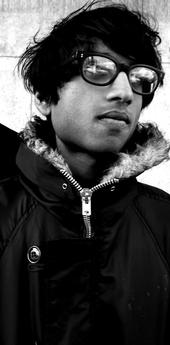Oxygentester is the alter-ego of Brooklyn native Dileepan Ganesan. Armed with a laptop and a head full of music, Ganesan adds his unique flair to electronic music as Oxygentester. Sometimes atmospheric, sometimes claustrophobic, his music is always intriguing and danceable. Oxygentester fully embraces the technology of the moment, planning to make every sound "viral", uploaded onto this page the second it is created. It is an exciting world with exciting sounds, so check back often to this page for new songs and musical ideas. We are more connected than ever, so let's evolve together.
------------------------------------------------------------
------------------------------
Hello all,
I have decided to start blogging by extolling some thoughts on remixing and it's role in society. From earliest cultures (cavemen and beyond) the oral tradition was the primary means of cultural exchange. A person would put their own spin on the stories of the day, and thus, the reimagined work reflected not only the culture but also individuality of the storyteller.
Music too was transmitted from person to person, and folk music was created. Whether it be a particular note phrase, a beat, or a story, the folk song became personal for each musician reinterpreting the song. In a sense, music was one large song that was shared by all, but by using this "song" as a constant, each artist could vary it, and add their distinct flair and character. The cream of the crop would rise to the top, and today we still play the best of these folk songs.
Each culture has had their own "song" to transfer. The ancient Africans used mainly the drum, to entertain as well as communicate. Slight variations in beat would not only add variety to life, but would relay specific messages as well. Ancient India had its raga, a primary set of tones in which drone would lead to improvisation. The American mountain regions had its bluegrass, which was recorded and transcribed by historians/producers hoping to capture their idea of the sound of the Appalachias.
Which brings us to recorded music. Would the oral tradition die with fixed recorded medium? Obviously, musicians still cover other people's songs, and put their own personality into it, but this is only a limited possibility of the sharable quality of recorded sound. With technology, we are able to share not only the finished product, but the dissected work as well.
With programs like Reason and even Garageband, we can send electronic files of the various components of recorded song (the tracks, effects, etc.) to one another in a matter of seconds. Now, more than any time before, we are able to share the process of creation, rather than just the finished work. The oral tradition of the caveman has returned; we share our culture in a manner that can be altered and indiviualized according to the whim of the listener.
Freed from the confines of CDs, mp3s, and vinyl, our music is now dissectable and remixable. The oral tradition has returned, and it can bring our culture together in unimaginable ways. While cavemen would tell stories amongst the fire to their own tribes, our stories and sounds are being transmitted electronically around the world. It is a global aural tradition we are creating, and it has the possibility of uniting and furthering society to its furthest potential.
So if you should desire to continue the folk tradition of reinterpretation, don't hesitate to write me and ask for the original files of songs found on the site. With these files, you will be able to put your own character into the song, and perhaps even, improve upon the original!
-DG, 3/16/07
